THE SECRET ADMIRERNewlyweds Mais and Eric have been together for about 3 years and have only been married for 2 months. They met through their friends and after one encounter they fell for each other. They were quite the clichés according to their friends. They lived in the nicer parts of town finally able to save up for their own home together, itching to start up a family. Mais was certainly beautiful. Her light brown locks curled slightly at the ends and fell perfectly in the middle of her back. She had a gentle face that matched her serene heart. Her eyes a pale blue that drove Eric insane.
He wasn’t the only one to fall for Mais, there were many others Mais had never been interested in dating until she met Eric. During her high school years plenty had tried but none had succeeded. Mais was Eric’s trophy, especially since she was way out of his league. Eric was fit but he embraced the “nerd style”. He had large glasses that took almost half of his face, his shirt was always tucked into his pants with suspenders holding them up. Many of their friends described them as the ‘Up’ couple since their routine was almost identical to theirs. Every morning Mais would help with Eric’s bow tie and straighten his glasses. They were adorably disgusting. Though one afternoon, their first piece of mail at their new home would jeopardize everything. Mais had just returned home from work, she had many papers to correct but kindergarten work wasn’t necessarily a hard task to grade. Her binder was pressed up against her chest held there by her arm while her free hand searched for her keys. She was so busy trying to fish out her keys, she stumbled over a bouquet of roses at her doorstep. She managed to catch her binder but unfortunately the vase containing the flowers had cracked. Her eyebrows furrowed together as she carefully placed her things on the ground. She braced herself for the cold cement, kneeling down to the flowers. A bright pink card caught her attention and she quickly retrieved it. Every day I fall more and more in love with you. — your love A smile appeared on her face as she brought the card up to her chest. Her mind quickly going to Eric, he was always displaying cheesy acts such as this one. “If only you left this on the table...” she sighed as she sadly looked at the beautiful transparent vase that was now scattered across her steps. She tucked the letter into her pocket and placed her items inside the kitchen on top of one of the boxes entitled “FRAGILE, GLASS”. She then proceeded to bring in the flowers and placing them in a larger glass cup and swept up the rest of the mess, cautiously placing the remains in the garbage. After a few hours Eric finally arrived home. By this time Mais had successfully graded all the papers and was on their last box for the kitchen. Eric stepped inside and curiously looked around their kitchen. “I thought we agreed on unpacking together?” He questioned but was quickly greeted with an eager kiss. Before they had the chance to intensify the kiss he broke free of Mais. “What was that for?” He asked breathlessly, his glasses slipping off of the bridge of his nose. “Well...” she started as she slowly pushed his glasses back up his nose. “Think of it as a thank you present for those beautiful roses you left me.” Eric stood there curiously and looked over at the flowers in a cup, his eyebrow raised as he looked back over at his wife who was beaming with excitement. “Leaving it inside would’ve been easier but I guess it was a cute surprise.” She continued as she tidied up the flowers to make them more presentable. Eric stood there at the door quizzically, studying the flowers. “I didn’t send that.” His statue became slightly defensive as he eyed the flowers on the table. Mais’s smile morphed into a thin line as she rubbed her lips together. “You didn’t?” She looked over at the flowers, quickly pulled out the card and scanned for an address. “Huh, there’s no address on it.” She looked back over at Eric and her smile came back and she tossed the card on the table. “C’mon Eric!” She teased. “I know you sent it you nerd.” She continued, gently snaking her finger under his left side suspender and lifting it up so the thin fabric snapped back down on his shirt. Eric seemed unphased by this action as he pushed past Mais and walked towards the table grabbing the small envelope. His eyes scanned over the pink paper and he slowly pulled out the letter. He read the words and looked back up at Mais who seemed beyond confused. “I didn’t send it”, he repeated. Mais was naturally an optimistic person so her smile in this situation wasn’t unusual but Eric didn’t find it very necessary. His brows furrowed together and the corner of his lip curved downwards. He proceeded to crumble up the letter and tossed it aside next to the flowers. Suddenly Mais erupted into giggles and Eric looked over at her angrily. “What?” His voice showing traits or irritation. “You’re jealous aren’t you?” Her giggling never ceased as she made her way over to an enraged Eric. “Of course not!” He seemed highly insulted to be accused of this even though a small voice in his head agreed with Mais. “You don’t find it odd that some guy-” he was cut off with “Or girl” by Mais. “Guy or girl whatever! A stranger just left this on our doorstep a week after we move in?” He asked and Mais just shook her head as she wrapped her arms around his middle and looked up at him. “Think of it as a welcome to the neighborhood gift.” Her voice deemed sincere but Eric could sense the teasingness in her voice. Rolling his eyes finally looking down at his wife who as certainly amused by this. He couldn’t help but smile down at her “A welcome to the neighborhood by Your Love,” he paused and his smile turned into a concerned frown. “But I’M your love, right?” His question was answered by a quick peck to his lips by Mais. “My one and only.” That night Eric and Mais slept good. A few days had passed since the flowers incident and half of their house was unpacked. It was a Saturday afternoon and Mais was home finishing up unpacking the living room decorations that her and Eric started with the night before. She smiled at their wedding pictures and hung them up behind their beige couch. The sound of an unsuspecting doorbell triggered a jump from Mais and she dropped one of the smaller pictures. Thankfully it didn’t break, the soft couch broke its fall. The doorbell rang again and Mais sighed heavily and cautiously got off the couch. “I’m coming!” Her voice elevated as she moved towards the front door. She opened it but she didn’t see anyone. She stepped out and looked around but she still didn’t see anything. “Ding dong ditch already?” She asked no one in particular and made her way back inside. Then the sound of heavy knocking on her backdoor scared her almost half to death. “Really?” She yelled as she made her way to the backdoor. She swung the kitchen door open and again was greeted by no one. She was just about to close the door when a heart shaped box and a small card caught her attention. She bent down curiously, the corner of her eyes searching for someone then focusing on the card that read, “Your one and only” She quickly grabbed the box and brought it inside, quick to dial Eric. “Where are you?” “What do you mean? I’m at work I’ll be home around 4.” His voice was rushed and she could hear him furiously typing away at his own keyboard. “You mean you didn’t…” Her voice trailed off as she looked out through the small window on the kitchen door. “Didn’t what?” He asked but then dismissed it. ”Listen I have to go I’ll see you when I get home okay?” Before she could protest Eric had hung up. Nervously she tossed the the box of chocolates in the trash. Her hands began to tremble as she looked at the letter, whoever he or she was, they had just made it clear they were watching her. She never mentioned the package to Eric. With his reaction the first time she could tell he was angry and if this mystery person kept sending things he’d probably assume she’s been having an affair. Mais didn’t want to lose everything they had worked so hard for so if she got the occasional packaging she’d just toss it out. The person seemed to be a desperate romantic most likely harmless. The love letters and gifts became more regular, every other day. Always around a time Eric wouldn’t be home. Though she was terrified this person had memorized their schedules she was also somewhat thankful Eric wasn’t around to witness it. Mais tried to make contact with the person but even when she waited at the door they’d just drop the gift off at the other. She couldn’t win so she stopped trying. The letters often were cheesy lines or cutesy poems. Mais would let her imagination wonder, she wanted to believe Eric was the one writing them. With that mindset she didn’t feel so bad receiving them even though she knew it wasn’t the case. The doorbell rang and Mais followed with the routine of her checking first the front door then the back door. A baseball bat in hand as she did so (she started carrying it with her just in case this person ever became handsy). The present surprised Mais, which was weird considering she’d been at this for at least two months now. The envelope was simple, plain white. Usually the letters had always been colorful but this was the first white one she had gotten. Perhaps it wasn’t her secret admirer. Hesitantly she retrieved the letter and quickly shut and locked the door behind her. The light haired beaut leaned the wooden bat against the wall and took a seat at the kitchen table. As she teared through the envelope she could tell something was off. There was indeed a single piece of paper folded up. The tips of her finger grazed the crease of the fold. She proceeded to pull it out again surprised at how many times the paper had been folded. An entire sheet was a small square barely the size of her palm. As she began to unfold it she noticed all the words were messier than usual and were written in all caps to portray yelling. After a few seconds the small square was now an average sized piece of paper. The fear in her eyes present as she read the words on the page. HELLO LOVE, REMEMBER ME? PROBABLY NOT. YOU TAKE MY GIFTS AND LEAVE NOTHING FOR ME. WHY IS THAT? YOUR BEAUTY STRUCK ME THE FIRST TIME I SAW YOU I JUST HAD TO MEET YOU IN PERSON. I THOUGHT THESE LETTERS AND PRESENTS WOULD MAKE YOU FEEL MORE COMPELLED TO SEE ME. WHY DO YOUR WASTE YOUR TIME WITH ERIC? YOU CAN DO SO MUCH BETTER, TOGETHER WE’D BE SUCH A BEAUTIFUL COUPLE. YOU CAN’T DENY THAT. LET ME MAKE THIS CLEAR, I WILL NOT LET YOU WASTE YOU’RE TIME WITH THAT MAN. I REFUSE. WE BELONG TOGETHER. WAIT FOR ME. Her hands felt sweaty, quickly Mais crumbled the letter and tossed it into the trash. Just as quickly as she had thrown the letter out, she snatched it back. This was a threat, wasn’t it? She continued to re-read the letter while nervously biting the skin around her finger nails. She had to tell Eric, this person was becoming dangerous. Mais tried his cellphone but it went straight to voicemail, she looked over her shoulder and noticed his charger casually laid on the counter. He had forgotten to bring it with him to work. She took a long breath and considered contacting the police but she knew she needed to speak with Eric before everything got out of hand. Needing to regain a peace of mind before this note drove her crazy with worries, Mais found her way straight to the cabinet to the left of the sink, where they decided to keep their wine until they could afford a wine cooler. She didn’t bother with a wine glass, she simply grabbed the first glass she could get her hands on and gulped down the red liquid. Sometime during her few drinks (3-4) she found herself beginning to doze off watching a random televised show being aired that day. After a few hours passed she found herself groggily opening her eyes. For a moment she had forgotten all about her secret admirer but when the name Eric crossed her memory she straightened. Her eyes glanced at the cable box reading 12:03am. At this realization she was at her feet and ran right to the window, Eric’s car was safely parked in the driveway. She smiled and made her way up to their bedroom, she was halfway up the stairs when the doorbell rang. She froze in her steps and glanced upwards, he was probably sleeping. Besides it was way out of schedule for her crazed fan. It was probably some delinquent teenagers or their friends. Steadily she pivoted on the heel of her foot and made her way down the steep growing steps. When she finally reached the bottom she gently opened the front door. Her heart almost gave out when she saw a neat black package tied with a red bow. Everything in her body told her to turn back around and wait until morning but there was something about this particular box that compelled her to open it. This time she didn’t move the box indoors, she knelt down in front of it and began to tug at the aesthetically pleasing bow. It wasn’t hard to undo the knot since it was only tied over once. The second she lifted the top of the box you could see a mixture of horror, sadness, and fear that partook in those pale beautiful eyes. A scream like no other escaped her delicate lips as she fell over on her backside. Mais began to crab walk backwards until her back hit the first step. “Eric!” She screamed again, scrambling to her feet as she raced up the stairs. Practically tripping over herself until she made it into their room and ran straight to the body under the covers. Frantically she began to shake her husband. “Eric, Eric you need to wake up now!” She demanded but her words were cut short when she felt something warm and moist skin her palm. Her clean hand lunged straight for the lamp and you could see the immediate realization on her face as she saw the crimson liquid staining her hand. “Oh no no...” her frantic cries became blubbering sobs as she pulled the blanket off of Eric to reveal a wound deep in his chest. Right where his heart should’ve been was a craved hole, his face as pale as her eyes. His heart was the lifeless, bloodied heart in her most recent package.
1 Comment
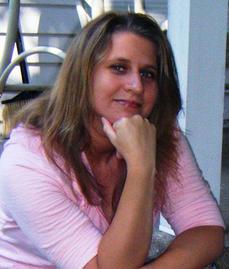 Molly lives in rural Indiana where she works as a freelance writer and author. While she mainly dabbles in the science fiction and horror genre, she has also been known to write children's stories, the occasional quirky greeting card verse and some questionable poetry. Visit her website www.authormallman.blogspot.com to learn more about current and upcoming writing projects as well as book release dates. M. Allman http://www.authormallman.blogspot.com Goodreads Profile http://www.facebook.com/authormallman https://www.amazon.com/author/m-allman https://hubpages.com/@mollyallmansmith East of OmahaHeadlights illuminated about a quarter mile of the never-ending highway. Doug yawned. He slapped his face in an attempt to stay awake. As drove on he noticed a figure moving alongside the road ahead.
“A damned hitchhiker,” he said to himself. The car sped past. Doug glanced in his rearview mirror and saw the dark figure jumping and waving his arms, his middle finger gesturing on each hand. Dough slammed on the breaks and squealed his tires as he sped backward. The hitchhiker jumped to the side of the road. The stranger opened the passenger door. “You could’ve killed me.” Doug snickered. “I’m going as far as Illinois if you want a ride.” The stranger slid into the seat. “Name is Roy, and I’ll take what I can get.” Doug sped off before Roy could shut the door. He glanced at his passenger from the corner of his eye, noticing a patch of dried blood on his pinky. He reached down and reassuringly patted the 9 mm Beretta under his seat. Roy turned up the radio. “You mind? I love this song.” Doug shook his head. “On a long lonesome highway, east of Omaha…” He mumbled through some of the words. “Good song, very fitting.” Doug reached over and turned it down. “I didn’t say you could sing.” “K, sorry…man, you havin’ a bad night or what?” Roy slid a cigarette pack out of coat pocket. “You mind?” “No, just crack the window a bit.” While lighting his cigarette, Roy noticed the dried blood on his hand. “Yeah, got in a fight last night. Worked the guy over pur-tee good.” “I saw the blood.” Doug rolled his window down. “What’d you do? I’m a roofer.” Roy took a drag off his cigarette and flicked the ashes out the window. “I plan on findin’ me some work when I get settled somewhere again.” Doug sat silently, his eyes on the road. “Yep, that girl I was fightin’ over, nothing but trouble. All women are ya know.” Roy leaned up against the door and folded his arms, yawning. A knife peeked out of his jacket pocket. Doug caught a glimpse of it in his peripheral vision. “I’m stopping up ahead to take a leak.” Doug pulled into a gas station. When he opened the car door the dome light shone on a gun handle under his seat. Roy rubbed his jacket pocket feeling for his knife. Damn, a gun! That's not part of my plan. Doug got back into the driver’s seat and sped off, keeping his eyes on the road. “I’m from Omaha, heading for Chicago.” He felt around under his seat. “I don’t like nosey people asking me questions, so that’s about all you need to know. Roy put his hand on his knife. His heart raced. “Sur…Sure, I can ride quietly.” Doug’s hand stopped, and he brought up a flask. Driving with his knees his opened and took a sip. “You wanna swig?” he asked, wiping off his lips. Roy slipped his hand off the knife and took the flask. “Sure.” The old rusted Chevy Caprice rolled on. The two men sat in silence. Roy pretended to be asleep while revising his plan because a gun was not part of it. I gotta get that gun out’a his reach. He opened his left eye just enough to see what Doug was doing. Street lights lit the dark night. We must in a town. He heard the turn signal clicking and felt the car move into a parking space. A cool breeze blew in as Doug opened the door, bringing with it the smell of gasoline. He waited for Doug to go inside to pay before reaching under the seat. Grabbing the gun, he quickly tucked it down the back of his pants. He covered it with his coat, leaned back against the door and closed his eyes. Roy felt the car moving. They were on the road again. He remained silent with his eyes closed, waiting for his chance to put his plan into action. Every few minutes he opened his left eye, just enough to get an idea where they may be. Shifting in his seat, he turned his face toward the window, waiting until they returned to a long, dark highway before pulling out the gun # Roy woke abruptly. He looked around, confused. Damn, I actually fell asleep. “Where are we,” he asked, rubbing his eyes. “Out in the middle of nowhere, I suppose.” Roy watched for a good spot to pull over. He took out a cigarette to calm his nerves as he waited. And when cornfields were all he could see, he decided they’d gone far enough. He slipped his hand behind him. His sweaty palm braced the gun handle. “Pull over up ahead in that wooded area. He stuck the gun against Doug’s right temple. “Beads of sweat formed on Doug’s head. “What’s your problem, man? “ “Don’t talk, just do as I tell ya.” “Take it easy, I’m pulling over right now.” Doug stopped the car about a mile off the highway behind a cornfield and put the car in park. Roy’s hand trembled as he tightened his grip on the gun. “Okay, this is what’s gonna happen.” He licked his dry lips and looked around, his hands shaking. “You take your ID out of your pocket, real slow now. Give it to me and take mine.” The two men exchanged billfolds. “Now real slowly get out and when I tell ya, we’ll start walking toward the cornfield. “ Doug slid out of the driver’s seat and stood up. Roy slid out behind him and stuck the gun in his back. “Start walking.” “You gonna kill me?” Doug asked, walking with his hands in the air. “That’s the plan.” Roy shoved the gun deeper into Doug’s back. “What the hell for?” “Didn’t you notice that we look alike—I did.” His voice trembled and his eyes shifted at every sound” When I saw you at that truck stop back yonder, I noticed we looked similar, sorta like brothers or something. The beards, the mustache, the dark eyes and hair color. Why we could pass for each other easily and that’s why I picked you. “ Doug stopped. “That blood wasn’t from a fight was it?” “No. I had to kill the slut. She was messin’ round with my brother, so I killed ‘em both. Left both their bodies to rot back in Nebraska. You see, it won’t take ‘em long to link the murders to me, so now I’m you.” Doug spun around and kicked Roy behind the knee. As Roy fell, the gun fired, grazing Doug’s head. Roy jumped up and tried to shoot again, nothing. “Junk gun is jammed or something.” He used the butt to knock Doug on the head. Doug fell to the ground, silent. Roy ran to the car, tossed the gun under the seat and sped away. He drove until he reached a gas station. Doug had a duffle bag in the backseat of his car. Roy rummaged through it, moving items around until he found a change of clothes. He used the sink in the gas station bathroom to clean up before changing and renting a motel room to get some rest. Doug woke the next morning face down in the dewy grass, with his head throbbing. Rubbing the back of his head, congealed blood stuck to his fingers. The world spun as he stumbled toward the highway to flag down a car. A small gray, pickup skidded to a stop. A man jumped out. “Oh dear lord, what happened? “ He patted his shoulder. “Here, lean on me.” The man helped Doug into the passenger seat. “Hang on there, buddy. I’m taking you to the hospital. “ # Roy woke the next morning and jumped into the rusty old Caprice. He found a map in the glove box and spread it out in the seat beside him. Where to? Maybe Ohio? He went to get a cup of coffee and a pack of cigarettes before starting off for Ohio. Roy turned up the radio and sang loudly as he drove, keeping the window down and enjoying the fresh air. He drove on for about three hours before noticing a roadblock ahead of him. Looking to the left and the right, Roy saw no side roads. He slowed and idled up to the officer. “License and registration please.” The officer looked around in the car. “Sure. “ He slid Doug’s license out of the billfold and took the registration from under the visor. The officer took the information and went back to his car. A few minutes later cops surrounded Roy’s car. A voice sounded through a megaphone. “Get out slowly and get down on the ground. “ Roy looked around. It didn’t work, they know it’s me. How the hell? He opened the car door and spread out, face down on the road. Cops swarmed around. One of them cuffed him. “It’s Doug Trenton alright and he’s got a gun.” An officer slid a pencil through the trigger guard and held it up. “We need forensics out here,” called another officer, “there’s a bag in the back seat…full of evidence. The cops took Roy down to the station and booked him for murder. **** Doug made it to the emergency room. He had a concussion and lost some blood, but he was going to live. The cops entered his room a few hours later. “Roy Dwyer? We got a court order for your DNA.” “For what?” Doug asked. “We found the bodies, Roy—your brother and Sara Gribbons. She fought back hard. We’ve collected DNA from under her fingernails.” Doug smirked. “Sure, take it. I ain’t done nothin’." He opened his mouth. # Roy sat in a small interrogation room. A detective sat across from him. “So, we finally caught up with the Valley Ridge Mangler. I knew it was only a matter of time. “He leaned forward and spread several pictures across the table in front of him. “You ready to give a confession?” “I didn’t kill any of those people.” Roy’s stomach churned as he looked at the crime photos that lay in front of him. “I would never to that to anyone.” He looked away. “Come on, Doug. We got your DNA. We’ve got the duffle bag from your trunk with your victims DNA on it. We’ve collected fibers that match that the carpet in your car so stop jerkin’ us around and confess. “ “No, I won’t. “ Beads of sweat formed on Roy’s face. “You got the wrong guy, I’m not Doug. I—“He stopped. I can’t tell them I killed Doug. “We’re going for the death penalty unless you confess…then it’s life in prison without parole. It’s up to.” # Doug was released from the hospital and taken into custody for murder but was later released when DNA evidence didn’t match what the police had collected at the scene, and there was no other evidence linking him to the murders. Doug was a free man. The court appointed Roy an attorney, Jim Lawson. He sat down with Roy and listened to his story. Roy's voice shook as he told the story. "I didn't kill and carve up all those folks in that photo, but I did kill my brother and girlfriend…I didn't set out to ya, know." Jim nodded. "Go on." "I heard the two were messin' round behind my back, so I followed 'em to the river bank. They were lying on the hood of the car, kissin'. Makin' me sick." He hands trembled as he lit a cigarette. Smoke escaped through his nose as he continued. "I really didn't go to kill anyone, but I got so mad, ya know. I picked up a big rock and bashed my brother's head." Roy stared at the table and flicked his ashes. Tears filled his eyes. "Well, Sara she started screamin' and I tried to get her shut up, so I could tell her it was a mistake." He looked up at Jim and wiped his eyes and nose. "I didn't mean to kill her, but she just wouldn't shut up." Jim nodded. "So, how does all this tie you to Doug?" "I had a plan to find a guy who looked like me, steal his identity and start over. It was Doug, and I shot at him, and the last time I seen 'em he was layin' face down in the dirt." “So, you’re claiming it’s a case of mistaken identity?” Roy let out a deep sigh, leaned back in the chair and raised his hand to the sky. “Lord yes. I stole the guy’s wallet and tried to pass myself off as him. I may’ve committed some sort of second-degree murder, but I sure the hell ain’t your mangler fella. “ Roy and Jim met with the police and they agreed to take Roy’s DNA and compare it to the mangler’s victims. While waiting for the results, a handcuffed and shackled Roy was escorted to the dark highway east of Omaha where he left Doug’s body. “It should be right here.” He spun around, looking frantically for any sign of Doug. “I’m sure of it, ‘cause I remember that knotted tree over yonder, the headlights shined right on it.” The officers searched the area. One shouted, “Over here.” They all ran over, and he pointed down in the leaves at a spent shell casing and blood. “Okay, so far your story is checking out, ‘cept a dead man can get up and wander off, so where’s Trenton?” Rob shook his head. “I…I don’t know. “ The DNA sample didn’t match the sample from the mangler’s victims, but cops did link Roy to the two murders in Kansas, where he was, extradited, tried and convicted. About six months into his life sentence, Roy got a letter from Doug. It read: Sorry ‘bout your luck, but thanks to you, life’s good on the outside, and I perfected your plan, and Doug no longer exists." Ethan Vilu is a student, writer, and generally confused human from Calgary, Alberta, Canada. Their work has previously appeared in Peculiar Mormyrid, The Trinity Review, and The Newspaper. Death of a Forager |
Categories
All
|
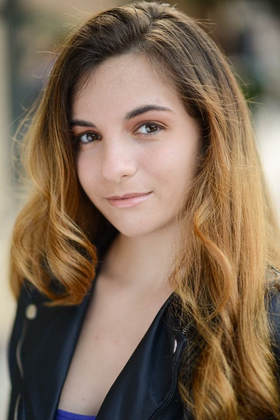
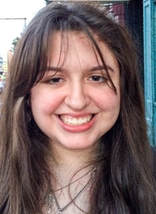

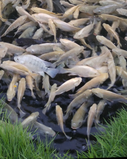
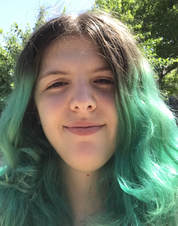
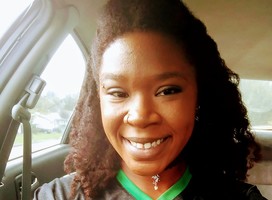

 RSS Feed
RSS Feed